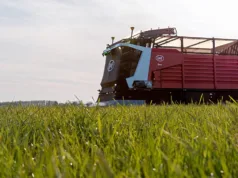
Danish manufacturer Samson Agro has added the single-disc TS slurry injector to its implement range. The new injector has been designed to offer accurate and gentle application of slurry for optimal utilisation in more crop types and soil conditions.
The new injector is available in two working widths, the 8.0m Samson TS 8 and 12m Samson TS 12. It works with Samson Agro’s PG II slurry tanker and SlurryMaster 8000 control to apply the slurry accurately, gently and intelligently.
With a narrow injector disc that opens a groove for injecting slurry, the Samson TS applies the nutrients exactly where the plants can best absorb them, without breaking and working up the soil as with traditional injection.
“It’s well known now that when the plants are allocated nutrients in the root system, in the right volume and at the right time, the emission of environmentally harmful substances is minimised,” Samson Agro product manager for slurry technology, Niels Haubjerg, said. “Together with the desire to reduce these emissions via slurry injection, new cultivation principles such as conservation agriculture, no till and strip till are now gaining ground. We developed Samson TS for use within these very principles.”
The new Samson TS is also fully prepared for automatic control systems with GPS and electronic application maps. The injector is divided into 1.0m wide sections, each of which can be operated individually via the SlurryMaster 8000 controller. Individual control with the eight or 12 sections helps to avoid over- and under-application when overlapping in wedges and headlands.
The Samson TS uses variable dosing to accurately inject the required amounts of nutrients via an automated process in collaboration with an ISObus compatible GPS system based on, for example, yield maps from past years.
The new system contributes to increased yield potential because of more efficient fertilisation, but there are also environmental benefits by reducing local over-fertilisation and applying nutrients depending on the absorption potential of the soil as well as the plants.










